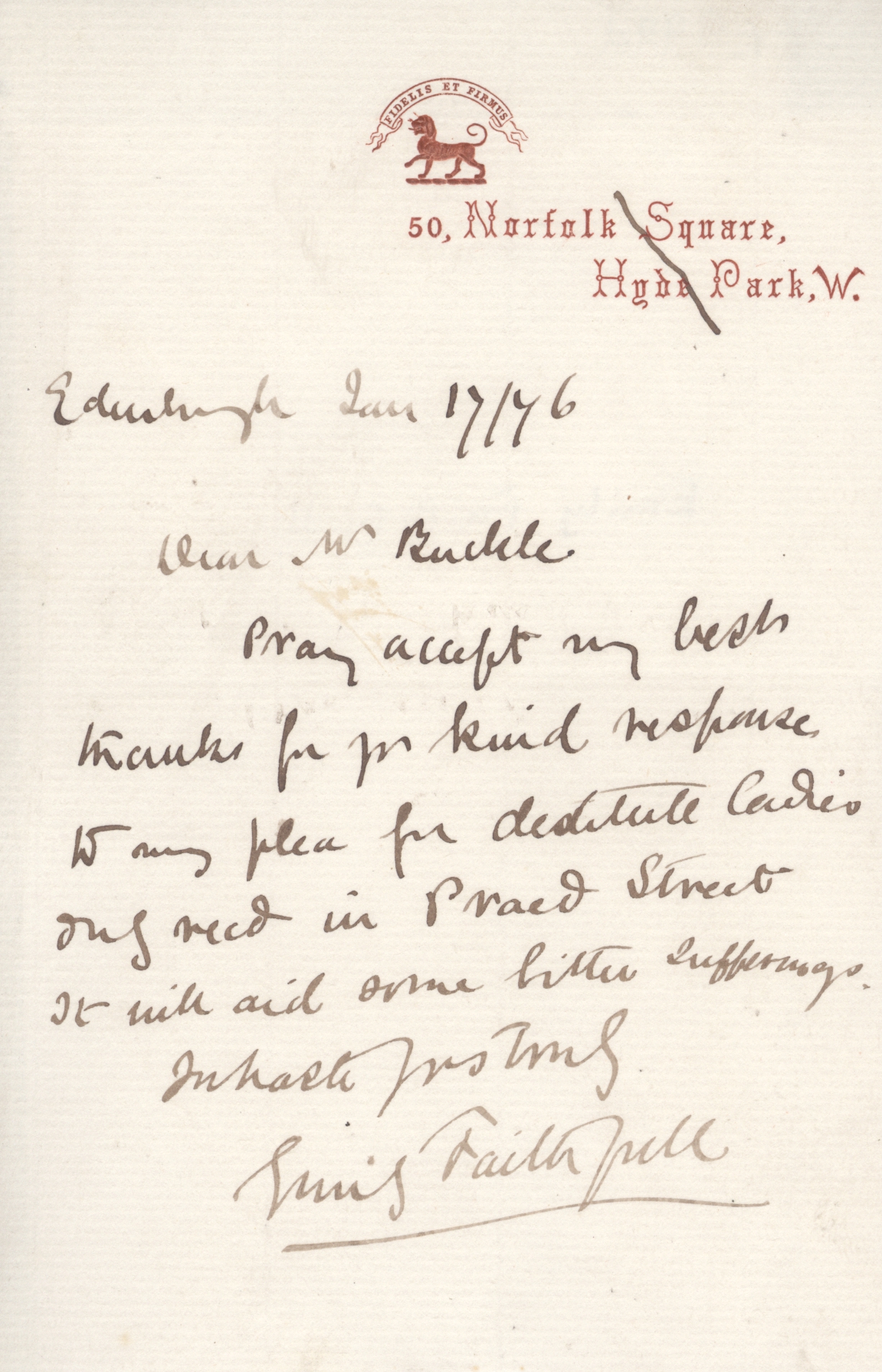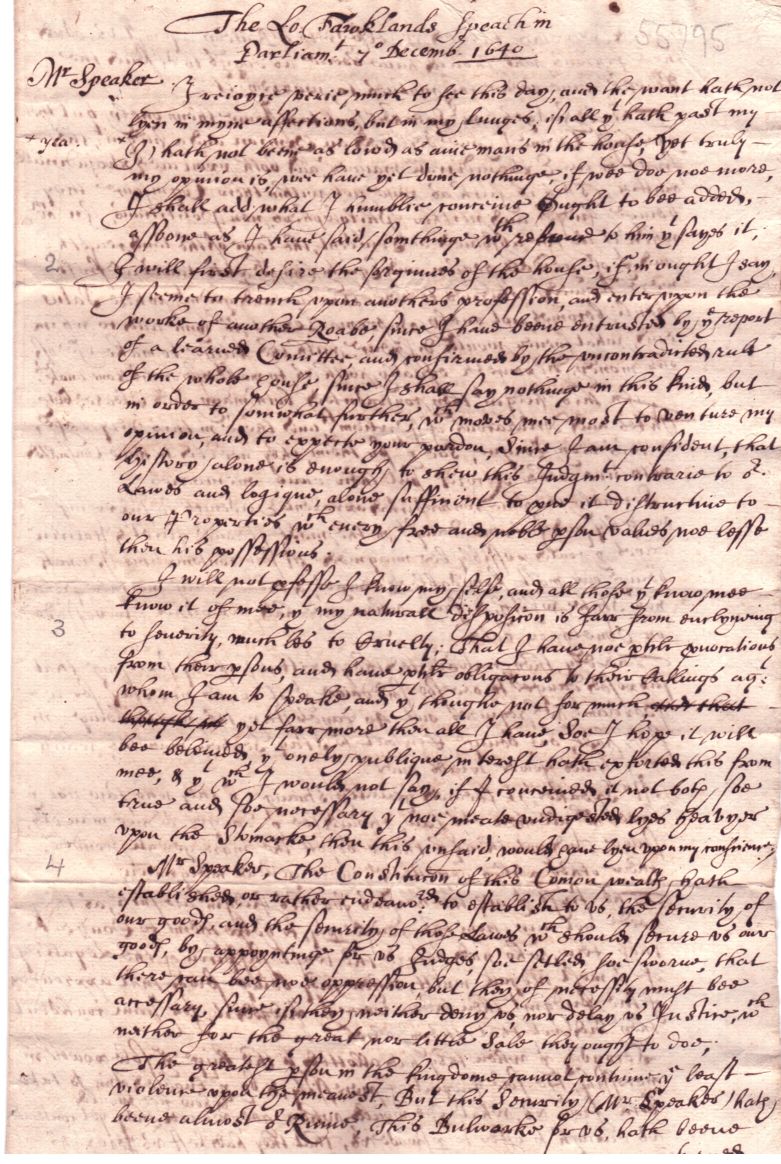FABER
(H.G., Town Clerk of Stockton-on-Tees)
LS to H. Pease, M.P. for Darlington,
asking him "to call the attention of the House" to the facts stated in an accompanying Memorial [not present], addressed to the Prime Minister, the Earl of Derby, in support of a separate M.P. for Stockton, "should any Reform Bill be brought before the House", 1 side 4to., Stockton-on-Tees, 22nd January
three small defects in blank margin
Item Date:
1859
Stock No:
52688
£35
Add to Wish List
Order/Enquire
Full Details
|
|
FAGAN
(George, British Diplomat at Naples and in South America)
Envelope front signed to Earl Russell, K.G. at the Foreign Office,
marked 'Private', no place, no date, circa
Item Date:
1863
Stock No:
53491
£25
Add to Wish List
Order/Enquire
Full Details
|
|
FAITHFULL
(Emily, 1835-1895, Propagandist for Women's Employment and Publicist)
Autograph letter signed to Mr Pritchard,
about her pension, "The year has opened badly ... recovering from gastric catarrh which has left rheumatism in its train!", 10 Plymouth Grove, Manchester, 13th January, no year, circa
Item Date:
1890
Stock No:
53492
£125
Add to Wish List
Order/Enquire
Full Details
|
|

FAITHFULL
(Emily, 1835-1895, Propagandist for Women's Employment and Publicist)
Autograph letter signed to Mr Buckle
thanking him for his "kind response to my pleas for destitute ladies ... in Praed Street. It will aid some bitter sufferings ...", 1 side 8vo., 50 Norfolk Square crossed out, Edinburgh, 17th June
Item Date:
1876
Stock No:
39831
£75
Add to Wish List
Order/Enquire
Full Details
|
|
 SHIP-MONEY AND THE WELL-BEING OF THE PEOPLE
SHIP-MONEY AND THE WELL-BEING OF THE PEOPLE
[FALKLAND
(Lucius Cary, 1609/10-1643, M.P. in the Short and Long Parliaments, 1640-1641, Moderate Royalist, from 1633 2nd Viscount [Scottish])]
Contemporary Manuscript Copy of his magnificent SPEECH AGAINST SHIP-MONEY
in the Commons debate that voted the king's Writ for Ship-money illegal, saying "Mr Speaker, I rejoice very much to see this day, and the want hath not lain in mine affections but in my lungs, if ... my yea hath not been as loud as any man's in the house" (para.1), and apologizing "if ... I seem ... to trench upon another's profession, and ... the work of another robe", (a lawyer's), "since I have been entrusted by the Report of a learned Committee", that on Ship-money, set up 1st December, but "History alone is enough to shew this Judgment", in R. v Hampden, 1637-1638, "contrary to our laws and logic" and "destructive to our properties which every free and noble person values, no less than his possessions".
Falkland's "natural disposition is far from inclining to severity" (para. 2), and indeed he has "particular obligations to their callings" against whom he is to speak, but believes "no meat undigested lies heavier upon the stomach, than this unsaid, would have lain upon my conscience" (para. 3).
"The Constitution of this Commonwealth hath established, or rather endeavoured to establish ... the security of our goods, and the security of those laws which should secure us our goods, by appointing for us Judges ... so sworn ... that the greatest person in the kingdom cannot continue the least violence upon the meanest. But this security, (Mr. Speaker) ... hath ... turned ... itself into a battery against us" and "those ... dogs to defend the flock, have been the wolves to worry it" (para. 4).
The Judges' "greatest crime" is to have declared "an opinion and a judgment ... such as came not within their cognizance ... they being ... neither philosophers, nor politicians", in which case "when ... the law of the land ceaseth", the law "of General Reason and Equity ... returns to her throne ... where Salus Populi [the Well-being of the People] becomes not only Suprema but Sola Lex [Supreme, the Only Law]", so that whatever applies to the king over our money applies equally to us in treating of "his and one another's". And indeed the Judges contradicted "many and clear ... Acts of Parliament ... and those in this very Case" and "very Reign" and needed only "to have consulted with ... their own memories" (para. 5).
The Judges supposed "weighty and imminent dangers, in the most serene, quiet, & halcyon days ... a few contemptible Pirates, being our most formidable enemies", and while the Writ claimed "it could not stay for a Parliament, which requires but 40 days stay", the Writ itself was "content to stay seven months which is that times four times over" (paras. 6,7).
Falkland hints that Judges were coerced, (para. 9), is indignant that, having given the king "the sole judgment of necessity" they claimed to have "left us our liberties and properties" (para. 10), and that, "which I confess moved me most", in transforming "free subjects ... into ... villeins", they "disabled us by legal and voluntary supply to express our affections to His Majesty, and ... cherish his to us" (para. 11).
"Mr. Speaker, the cause of all the miseries we have suffered ... is, that a most excellent Prince hath been most infinitely abused, his Judges telling him that in law, his Divines ... that in Conscience ... his Councillors ... that in Policy he might do what he pleased", now, since "words having done nothing", the only course is "taking away this Judgment and these Judges together, and of regulating their successors by their most exemplary punishment" (para. 12). "I will only say, we have accused a great person of High Treason", the Earl of Strafford, "for intending to subvert our fundamental laws, and introduce an arbitrary government", a charge which applies no less to the Judges (para. 13).
"We only accuse, the House of the Lords condemns", but he is wary of their possible leniency. Slowly but steadily he points the finger at "one I must not lose in the crowd" (para. 14), namely Finch, now Lord Keeper presiding over the Lords, whose place "admits him to His Majesty's ear, trusts him with His Majesty's conscience" and "puts the ... unlimited power of the Chancery into such hands, which in the safest would be dangerous", no one here is secure while "he who hath undone us already by Wholesale, hath a power left in him by Retail" (para. 15).
He quotes ironically Finch's own words "in the beginning of the Parliament ... that His Majesty never required any thing from any of his Ministers but Justice and Integrity", and moves that if Finch "shall be found guilty of tampering with Judges against public security (who hath thought tampering with witnesses in a private case worthy of so severe a fine); if he shall be found to have gone before the rest to this Judgment, and to have gone beyond the rest in this Judgment", then "in punishment for it, the justice of this House may not deny to him that due honour to precede and exceed the rest" (para. 16), paragraphs lightly numbered in margin in pencil to correspond with the version in Rushworth's Historical Collections, Vol. 4, 4 sides folio, House of Commons, Monday 7th December
tiny closed edge tear on side 3, a few tiny holes but perfectly legible, otherwise in fine condition
Item Date:
1640
Stock No:
55795
£1250
Add to Wish List
Order/Enquire
Full Details
|
|